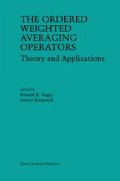Abstract
In this contribution an overview of the use of OWA operators to model a soft retrieval activity in Information Retrieval Systems (IRSs) is presented. In particular some extensions of the Boolean document representation and of the Boolean query language are introduced, and a possible evolution of these approaches is outlined.
Access this chapter
Tax calculation will be finalised at checkout
Purchases are for personal use only
Preview
Unable to display preview. Download preview PDF.
References
Biswas G., Bezdek J. C., Marques M., and Subramanian V. (1987). Knowledge-assisted document retrieval. I. The natural-language interface. II. The retrieval process. Journal of the American Society for Information Science, 38(2), March.
Bolc L., Kowalski A., Kozlowska M., Strzalkowski T. (1985). A natural language information retrieval system with extentions towards fuzzy reasoning (medical diagnostic computing). Int. J. of Man-Machine Studies, 23(4), October.
Bookstein A (1980). Fuzzy requests: an approach to weighted Boolean searches. J. of the American Society for Information Science, 31, 240–247.
Bordogna G., Carrara P., Pasi G. (1991). Query term weights as constraints in fuzzy information retrieval. Information Processing & Management 27(1), 15–26.
Bordogna G., and Pasi G. (1993). A fuzzy linguistic approach generalizing Boolean IR: a model and its evaluation. J. of the American Society for Information Science, 44(2), 70–82.
Bordogna G., and Pasi G. (1995) Controlling retrieval through a user adaptive representation of documents, Int. J. of approximate reasoning, 12, 317–339.
Bordogna G., and Pasi G.(1995). Linguistic aggregation operators in fiizzy information retrieval. Int. J. of Intelligent systems, 10, 233–248.
Bordogna G., Fedrizzi M., Pasi G. (1997). A Linguistic Modeling of Consensus for a Fuzzy Majority in Group Decision Making. IEEE Transactions on Systems, Man and Cybernetics, 1.
Buell D. A. and Kraft D. H. (1981). Threshold values and Boolean retrieval systems. Information Processing and Management, 17(3), 127–136
Cater S. C, and Kraft D. H. (1989). A generalizaton and clarification of the Waller-Kraft wish-list,” Information Processing & Management, v. 25, 1989, pp. 15–25.
Doszkocs T. (1986). Natural Language Processing in Inf. Retrieval. J. of the American Society for Information Science, 37(4), 191–196.
Kacprzyk J., Zadrozny S., Ziolkowski A. (1989). FQUERY III+: A ‘human-consistent’ database querying system based on fiizzy logic with linguistic quantifiers. Information Systems, 14(6).
Miyamoto S. (1990). Fuzzy sets in Information Retrieval and Cluster Analysis. Kluwer Academic Publishers.
Paice C.D. (1984). Soft evaluation of Boolean search queries in information retrieval systems. Information Technology: Research Development Applications, 3(1), January, 33–41.
Radecki T. (1979). Fuzzy set theoretical approach to document Retrieval. Information Processing & Management 15, 247–260.
Salton G., Fox E., and Wu H. (1983). Extended Boolean information retrieval. Communications of the ACM, 26(12), 1022–1036.
Salton G., Buckley C. (1988). Term weighting approaches in automatic text retrieval. Information Processing & Management, 24(5), 513–523.
Salton G. (1989). Automatic text processing: The transformation, analysis and retrieval of information by computer, Addison Wesley.
Sanchez E. (1989). Importance in knowledge Systems. Information Systems 14(6), 455–464.
Waller W.G., and Kraft D.H. (1979). A mathematical model of a weighted Boolean Retrieval System. Information Processing & Management 15, 235–245.
Yager R. R. (1987). A note on weighted queries in information retrieval systems, J. of the American Society for Information Science 38(1), 23–24.
Yager R. R. (1988). On Ordered Weighted Averaging aggregation Operators in Multi Criteria Decision Making, IEEE Trans. on Systems, Man and Cybernetics 18(1), 183–190.
Yager, R.R., (1992). Applications and Extensions of OWA Aggregations, International Journal of Man-Machine Studies, 37, 103–132.
Yager R.R. (1994). Interpreting Linguistically Quantified Propositions, International Journal of Intelligent Systems, 9, 541–569.
Yager R.R. (1994). Quantifier Guided Aggregation Using OWA Operators, Technical Report #MII-1504, Iona College, Machine Intelligence Institute, New Rochelle, NY 10801, November, 1994.
Zadeh L.A. (1965). Fuzzy sets. Information and control, 8, 338–353.
Zadeh L.A. (1983). A computational Approach to Fuzzy Quantifiers in Natural Languages, Computing and Mathematics with Applications. 9, 149–184.
Author information
Authors and Affiliations
Editor information
Editors and Affiliations
Rights and permissions
Copyright information
© 1997 Springer Science+Business Media New York
About this chapter
Cite this chapter
Bordogna, G., Pasi, G. (1997). Application of OWA Operators to Soften Information Retrieval Systems. In: Yager, R.R., Kacprzyk, J. (eds) The Ordered Weighted Averaging Operators. Springer, Boston, MA. https://doi.org/10.1007/978-1-4615-6123-1_21
Download citation
DOI: https://doi.org/10.1007/978-1-4615-6123-1_21
Publisher Name: Springer, Boston, MA
Print ISBN: 978-1-4613-7806-8
Online ISBN: 978-1-4615-6123-1
eBook Packages: Springer Book Archive

